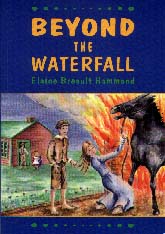|
________________
CM . . . .
Volume V Number 11 . . . . January 29, 1999
excerpt: When Maggie and Nicholas weren't studying or chasing the cows, she told him what was happening at school and in the community. Some days he seemed preoccupied. He moved slowly, and there was a pinched look on his face. On those days, she suspected he had been beaten again.This is Hammond's second time travel adventure featuring Maggie, a young down-to-earth protagonist whose lonely life with her great aunt helps to let her drift off into the past, this time to the Canadian prairies of the 1890's. Maggie finds herself taken for a girl named Ellie, whose family endures the typical pioneer catastrophes (wildfire, hail, blizzard, outlaws) and, just as typical, hard work and deprivation (poor food, threshing, herding cattle, the uncertainty of the weather). Maggie finds school to be tortuous until a new teacher arrives who gains the respect of the older boys by strapping their leader. The courting of the new teacher by all the available bachelors provides the book's lighter moments as Miss Fieldmont tries to find a refined enough man who will respect her strengths as a modern woman. Maggie meets Nicholas Camper, a "home child" sent from England to the Canadian colony as an indentured servant because his own mother is too sick to look after him and his father, a master shoemaker, is dead. Nicholas' unfortunate placement with one of the more desperate families of the community leads to his mistreatment and eventual absence from school. Nicholas' only hope is that his mother will get well enough to come to Canada and rescue him from the Ebenezer's. The local bookmaker writes a letter for him to the charity orphanage, asking them to get in contact with his mother and ask if she can come to Canada to work as a dressmaker in the rooms above his shop. The home inspector, called to the Ebenezer's by Miss Fieldmont, takes the farmer's side, and Nicholas drags on in his bondage, in which Maggie and her horses are his only solace. Overriding all this despair is the uneasy rumor that a gang of cattle thieves is operating in the neighborhood. Discovered by Maggie, they take her prisoner, and she realizes they also have captured Ellie, the girl she has become. Nicholas redeems himself in the eyes of the community by rescuing Maggie (Ellie) and is overwhelmed as his mother arrives from England and Maggie disappears through the waterfall to her own world. The end of the book has Maggie and her friend in the present day doing research in the library to find out what happened to Nicholas and Ellie and her parents. The time travel is managed smoothly in the present day as Maggie feels compelled to slip into the waterfall as she goes hiking. However, the sudden appearance of the waterfall in the middle of the pioneer prairie seems contrived. One wonders why this is a time travel. Why not just tell the pioneer story? This story is grim and gives today's children a very clear idea of the hardships people endured to build our country. It could stand by itself as historical fiction that would be very welcome in the study of the prairie and Canadian history. Accurate and full of fascinating detail, the pioneer part of the story is heart wrenching and, at the same time, uplifting as the community struggles to do the right thing if the face of incredible adversity. Maggie is a strong heroine. She is quick witted and determined in her fight to help Nicholas. Her longing for a warm, loving family is satisfied at the end as she realizes that she has changed her relationship with her (Ellie's) mother enough to say "I love you" and to receive a hug back. Although Nicholas represents the agony of all "home children," he is an individual as he struggles to overcome his fear of horses. The secondary characters are well done, with tiny details (mainly in the dialogue) that bring them alive. The book is well designed, with a clear font for the text and a more stylized font for the chapter titles. It is unfortunate that the cover picture seems to have been drawn by a child, and it does not have the power to attract young readers who are accustomed to more sophisticated art work. Recommended. Joan Marshall is the teacher-librarian and enrichment facilitator at Henry G. Izatt Middle School in Winnipeg, Manitoba.
To comment on this
title or this review, send mail to cm@umanitoba.ca.
Copyright © the Manitoba Library Association.
Reproduction for personal use is permitted only if this copyright notice
is maintained. Any other reproduction is prohibited without
permission.
Published by
TABLE OF CONTENTS FOR THIS ISSUE - JANUARY 29, 1999.
AUTHORS |
TITLES |
MEDIA REVIEWS |
PROFILES |
BACK ISSUES |
SEARCH |
CMARCHIVE |
HOME
|

